
The German Navy is the navy of Germany and part of the unified Bundeswehr, the German Armed Forces. The German Navy was originally known as the Bundesmarine from 1956 to 1995, when Deutsche Marine became the official name with respect to the 1990 incorporation of the East German Volksmarine. It is deeply integrated into the NATO alliance. Its primary mission is protection of Germany's territorial waters and maritime infrastructure as well as sea lines of communication. Apart from this, the German Navy participates in peacekeeping operations, and renders humanitarian assistance and disaster relief. It also participates in anti-piracy operations.

The Volksmarine was the naval force of the German Democratic Republic (GDR) from 1956 to 1990. The Volksmarine was one of the service branches of the National People's Army and primarily performed a coastal defence role along the GDR's Baltic Sea coastline and territorial waters.

Allied Command Transformation (ACT) is a military command of the North Atlantic Treaty Organization (NATO), formed in 2003 after restructuring.

The Supreme Allied Commander Atlantic (SACLANT) was one of two supreme commanders of the North Atlantic Treaty Organisation (NATO), the other being the Supreme Allied Commander Europe (SACEUR). The SACLANT led Allied Command Atlantic was based at Norfolk, Virginia. The entire command was routinely referred to as 'SACLANT'.

The Estonian Defence Forces is the unified military force of the Republic of Estonia. The Estonian Defence Forces consists of the Estonian Land Forces, the Estonian Navy, the Estonian Air Force, and the paramilitary Estonian Defence League. The national defence policy aims to guarantee the preservation of the independence and sovereignty of the state, the integrity of its land area, territorial waters, airspace and its constitutional order. Its main goals remain the development and maintenance of a credible capability to defend the nation's vital interests and development of the defence forces in a way that ensures their interoperability with the armed forces of NATO and European Union member states to participate in the full range of missions for these military alliances.

BALTOPS is an annual military exercise, held and sponsored by the Commander, United States Naval Forces Europe, since 1971, in the Baltic Sea and the regions surrounding it.

NATO CCD COE, officially the NATO Cooperative Cyber Defence Centre of Excellence, is one of NATO Centres of Excellence, located in Tallinn, Estonia. The centre was established on 14 May 2008, it received full accreditation by NATO and attained the status of International Military Organisation on 28 October 2008. NATO Cooperative Cyber Defence Centre of Excellence is an international military organisation with a mission to enhance the capability, cooperation and information sharing among NATO, its member nations and partners in cyber defence by virtue of education, research and development, lessons learned and consultation.
Fleet Command is responsible for the command, operations, readiness, training and force generation of all ships, submarines, aircraft squadrons, diving teams, and shore establishments of the Royal Australian Navy. Fleet Command is headquartered at HMAS Kuttabul in Sydney, and is led by the Commander Australian Fleet (COMAUSFLT), also referred to as Fleet Commander Australia (FCAUST), which is a rear admiral (two-star) appointment.
The Combined Joint Operations from the Sea - Centre of Excellence is a multinational military unit located in Norfolk, Virginia, accredited by NATO. The current director is Vice Admiral Daniel Dwyer of the United States Navy and the current deputy director is Commodore Tom Guy of the British Royal Navy.

The Lancaster House Treaties of 2010 are two treaties between the United Kingdom and France for defence and security cooperation. They were signed at 10 Downing Street on 2 November 2010 by British prime minister David Cameron and French President Nicolas Sarkozy.

Andreas Krause is a Vizeadmiral of the German Navy of the Bundeswehr, and he served as Inspector of the Navy. He previously served as a U-boat officer, as a staff officer in the Bundeswehr and NATO, as commander of the German Navy's 1st Flotilla and the Maritime Task Force for the United Nations Interim Force in Lebanon, and as Deputy Inspector of the Navy.
Rainer Maria Brinkmann is a Vizeadmiral of the German Navy, and the current Deputy Inspector of the Navy. He previously served in fast attack craft units, and in staff positions, and has a degree in education from the University of the Bundeswehr Hamburg.
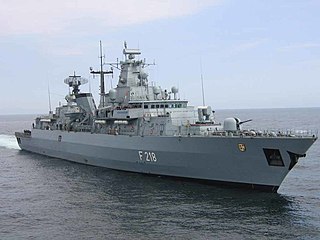
Mecklenburg-Vorpommern (F218) is a Brandenburg-class frigate of the German Navy.
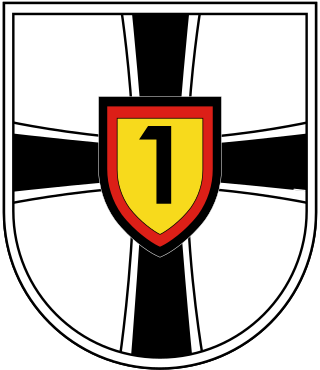
Einsatzflottille 1 is one of the three brigade-level units of the German Navy, in addition to Einsatzflottille 2 and the Naval Air Command. It is based in Kiel, Schleswig-Holstein, and is under the head of the Navy Command, based in Rostock.
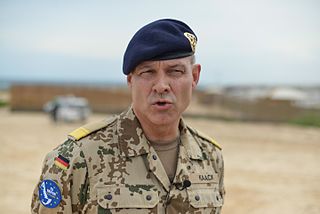
Jan Christian Kaack is a Vizeadmiral of the German Navy and as of March 11th, 2022 Inspector of the Navy.
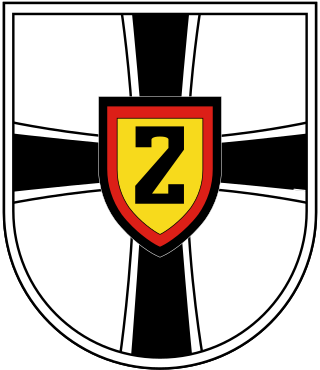
Einsatzflottille 2 is one of the three brigade-level units of the German Navy, in addition to Einsatzflottille 1 and the Naval Air Command. It is based in Wilhelmshaven, Lower Saxony, and is subordinated to Navy Command, based in Rostock.
SMS G197 was a S-138-class large torpedo boat of the Imperial German Navy. She was built by the Germaniawerft shipyard at Kiel between 1910 and 1911, and was launched on 23 June 1911, entering service later that year.
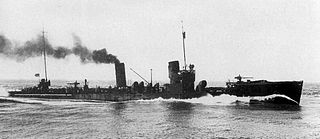
SMS V43 was a V25-class Large Torpedo Boat of the Imperial German Navy, that served during the First World War. V43 was built by AG Vulcan at their Stettin shipyard from 1914–1915, entering service on 28 May that year. V43 took part in operations in the North Sea, the English Channel and the Baltic Sea. She survived the war, and was interned at Scapa Flow, surviving the Scuttling of the German fleet at Scapa Flow. V43 was allocated to the US Navy, and was sunk as a target on 15 July 1921.
SMS V30 was a V25-class torpedo boat of the Imperial German Navy that served during the First World War. The ship was built by AG Vulcan at Stettin in Prussia, and was completed in November 1914.

The NATO Military Engineering Centre of Excellence is an International Military Organization (IMO) as designated by the Paris Protocol of 28 August 1952. The organization is a part of the NATO Centre of Excellence. Sponsored by fourteen European Union Member States, the United Kingdom, Turkey, Canada, and the United States, the Centre belongs to a wider framework that supports NATO’s transformation process. The organization's objective is to assist NATO member countries, nonmember countries, and international organizations in enhancing military engineering capabilities. MILENG COE is co-located in the German Army Military Engineer School in Ingolstadt, Germany. A sister-project is the NATO Cooperative Cyber Defence Centre of Excellence (CCDCOE).















